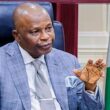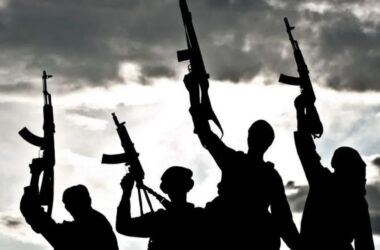The Inspector-General of Police, Kayode Egbetokun, has deployed a nationwide special strike squad in a fresh move to tackle the worsening security situation across Nigeria. The new order came on Tuesday during a meeting in Abuja with commanders of the Police Mobile Force (PMF), following recent deadly attacks in Kwara, Benue, and Sokoto states that left over 20 people dead.
Egbetokun directed all PMF units to have at least one combat-ready team on constant standby, stressing the need for swift responses during emergencies or high-risk situations. “The PMF was created as a strike force – to be swift, decisive and combat-ready,” the IG said. “Effective immediately, all PMF squadrons are directed to maintain at least one fully equipped, combat-ready unit on standby at all times.”
He also noted that every squadron would now send a unit for quarterly training that focuses not just on tactics but also on ethics, professionalism, and proper conduct. The IG said squad sizes would be trimmed and reorganised for greater speed and efficiency in the field. “From this moment, PMF commanders will be held vicariously responsible for the conduct of their personnel,” he said.
A clear message was sent to mobile police officers that the era of indiscipline is over. He also reiterated the ongoing withdrawal of PMF officers from non-essential escort duties, saying such deployments had weakened the unit’s combat capacity.
Meanwhile, the Kwara State Police Command confirmed a deadly attack on a motor park in Ilesha Baruba, Baruten LGA, where six people were shot dead by unknown gunmen. Another attack was recorded in Kemanji, where a vigilante was killed during a night patrol. The command has arrested an informant linked to a known bandit network.
“In a swift operation, our team arrested an individual who confessed to working with bandits. His information is proving useful,” said police spokesperson Toun Ejire-Adeyemi.
Elsewhere, in Benue State’s Ukum LGA, a man known as ‘Government’ reportedly went on a shooting spree that killed at least 11 people. While locals described him as mentally unstable, the state’s Information Commissioner, Mathew Abo, maintained that he was a known bandit.
National Security Adviser, Nuhu Ribadu, who visited Makurdi to sympathise with the people, noted that insecurity in Nigeria is rooted in longstanding criminality rather than politics, religion, or ethnicity. “We have improved greatly from the time we came in. It’s a process, a journey,” Ribadu said, appealing for patience as the government works to restore safety.
In Sokoto State, the Lakurawa terror group attacked Adarawa and Huymar Dutsi villages, killing three people and looting shops and livestock. Locals reported that the attackers moved on motorcycles and carried AK-47s, creating panic in surrounding communities. Eyewitnesses said the group even mounted illegal roadblocks to rob traders transporting livestock.
The Northern States Governors’ Forum, led by Governor Inuwa Yahaya of Gombe State, is pushing for a coordinated regional response. Yahaya is rallying his fellow northern governors to improve intelligence sharing and launch joint security operations. “He has continued to reach out… urging for stronger inter-state cooperation,” said Yahaya’s media aide, Ismaila Misilli.
In Katsina State, Deputy Governor Faruk Jobe reported that N36.8 billion had been spent on security improvements, including the creation of a local vigilante force and the purchase of armoured vehicles, motorcycles, and surveillance equipment. Over 1,400 security personnel have been deployed to frontline LGAs.
Ondo State also took similar steps, with Governor Lucky Aiyedatiwa announcing the deployment of 115 soldiers to tackle bandit activity in Akoko. The state also plans to recruit more Amotekun personnel and establish a security trust fund.
Amid the chaos, Benue Governor Hyacinth Alia blamed the attacks in his state on foreign invaders. “They do not bear the Nigerian look,” he said on national TV. “These folks are coming in fully armed… They are not Nigerians—believe it.”









